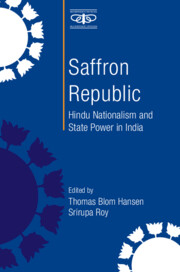3 - Normalizing Violence: Lessons from Hindu Nationalist India
Published online by Cambridge University Press: 31 May 2022
Summary
Hindu nationalist violence has a long ancestry, but its modalities have changed. If in the past the Rashtriya Swayamsevak Sangh (RSS) and its affiliates engineered ‘riots’ by spreading rumours and aggravating local tensions, they no longer need to do so. In the current political environment and amidst the massive growth of social media, the mere suspicion that a Muslim or Christian is violating Hindu social codes is justification for violence. While in the past, the Bharatiya Janata Party (BJP) fostered Hindu–Muslim tensions prior to elections to influence their outcomes, it now does so more frequently and less predictably. Hindu nationalist violence has increasingly become both routinized and normalized.
As a result, the targets of hate violence have grown. Although they are generally religious minorities, they have come to include students, intellectuals, and human rights activists who challenge religious orthodoxy and government policy. They include Dalits who challenge upper caste domination, as they did in Bhima Koregaon, Maharashtra, in January 2018, when they celebrated the defeat of an upper caste Hindu ruler 200 years ago. They include women who sought to enter the Sabarimala temple in Kerala to assert their equality in matters of faith after the Supreme Court authorized them to do so in 2018. They include students from Jamia Millia Islamia, Aligarh Muslim University, and Jawaharlal Nehru University (JNU).
Most existing scholarship on ethnic violence, including my own, has focused on politically motivated group violence, or what is commonly termed a ‘riot’. The concept of ‘riot’ implies a certain unspecified threshold of violence with respect to the number of people injured and killed, and the amount of property destroyed. However, the term ‘riot’ has always been flawed because it ignores the pattern since the 1990s of well-planned Hindu nationalist attacks on Muslims. It has become even less useful amidst the normalization of Hindutva violence since the BJP was elected to national power in 2014.
Documenting recent developments in India, I argue that we need to devise new ways of conceptualizing violence that recognize its significance, independent of the scale of any single incident; appreciate the links between laws, public policy, and physical assault; and identify the webs of complicity between the state, political parties, and civil society.
- Type
- Chapter
- Information
- Saffron RepublicHindu Nationalism and State Power in India, pp. 59 - 71Publisher: Cambridge University PressPrint publication year: 2022
- 1
- Cited by



